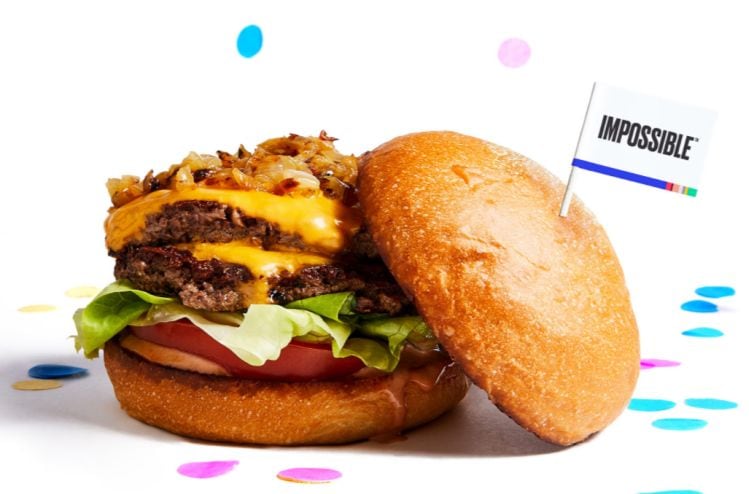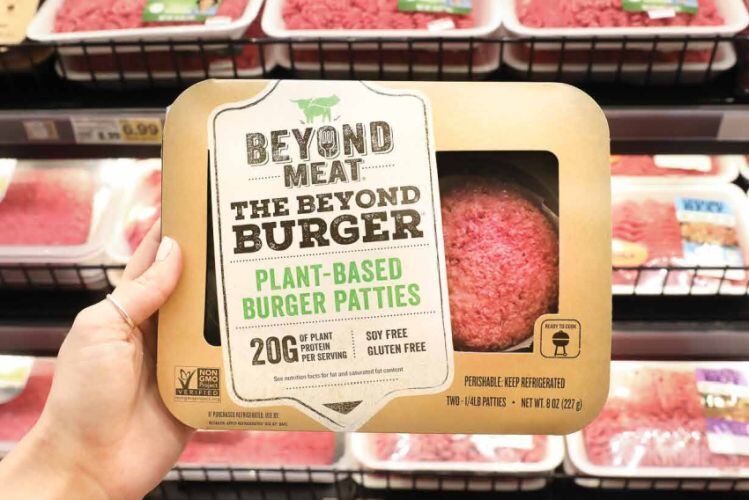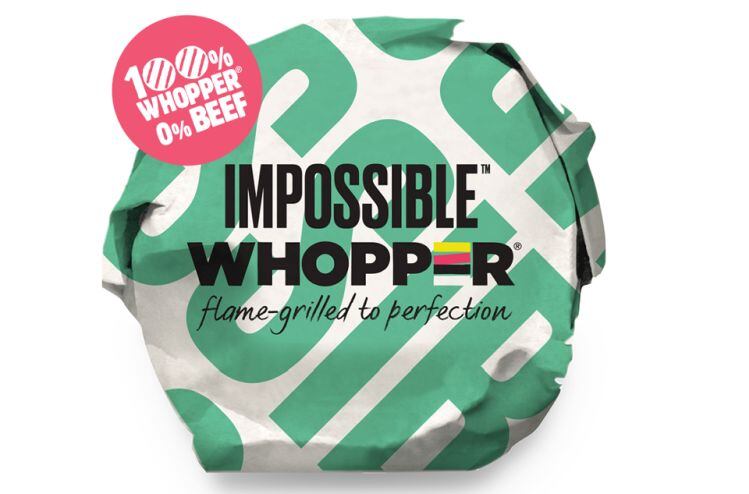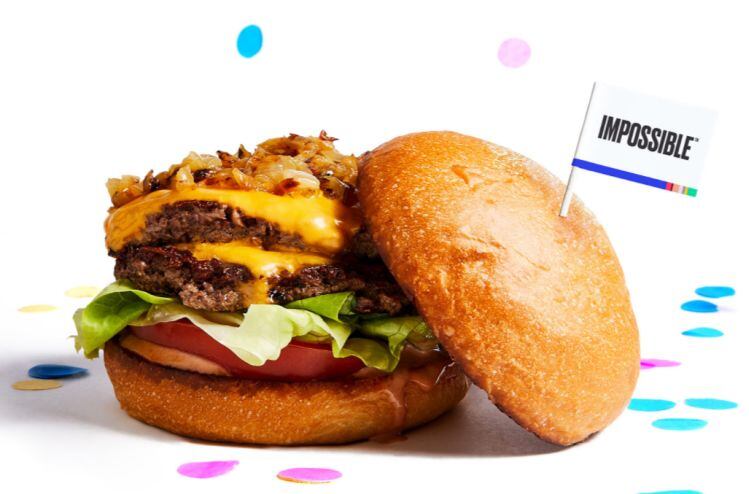Chief financial officer David Lee was speaking to FoodNavigator-USA after announcing a $300m funding round led by existing investors Temasek and Horizons Ventures and celebrities including Serena Williams and Trevor Noah that takes its total investment to more than $750m.
“Our R&D platform is about fundamental discoveries that go beyond just one product, although we haven’t released a schedule yet of the new products to come," said Lee.
Impossible Foods’ co-founders Dr Pat Brown and Monte Casino were also co-founders of plant-based dairy company Lyrical Foods (Kite Hill), so have significant experience in developing dairy alternatives and proprietary cheese cultures.
However, Lee would not say whether Impossible Foods’ approach to the dairy category will be plant-based (eg.using nuts, seeds, legumes etc) or whether it plans to produce 'real' dairy proteins via microbial fermentation (along the lines of what Perfect Day is doing) given its experience with yeast fermentation to produce the star ingredient in its burgers: heme.
Published patents don’t provide too many clues as to what the company is working on today, although a patent published in April 2015 describes methods of producing non-dairy milks and cheeses using a variety of plant-based sources from nuts and seeds to legumes.
Stay tuned on dairy
Lee added: “We have an entire dairy platform within our R&D capabilities, but our focus is on commercializing our products for meat first. We haven’t yet announced the launch of our first dairy products, but stay tuned.”
The core product – the Impossible Burger – is also a work in progress despite recent improvements, he said: “I feel that the Impossible Burger 2.0 is already as delicious as the burger from a cow, but give us time, and we can make products that are arguably even more beefy and delicious than the incumbent product.”
Heme patents
While Impossible Foods has raised a jaw-dropping amount of money for a food company, albeit one supported by a lot of IP, Lee said he was confident they it generate the returns that justify such a large investment given the size of the addressable market.
“I believe Impossible Foods is serving an enormous market opportunity. 90%+ of our consumers are self-avowed carnivores, and you’re talking about a $1.5tr global market.”
Asked about the competitive edge heme – the star ingredient in the Impossible Burger – provides the company, given that there are now other firms claiming to be able to produce it (Triton Algae Innovations claims it can make a Non-GMO heme from algae, for example), Lee said:
“Our IP and our brand are unique differentiators… I’m not an IP attorney, but I do know that our globally issued patents cover the use of heme, any heme, in plant-based meat and I think we have a unique set of technology to make heme in a high quality low cost way. I can’t comment on others and their approaches, but I do think that this precludes others from a IP standpoint from using heme to make delicious meat.”
Increasing capacity
Demand for the company’s burgers – which are now sold in 7,000+ locations from Burger King, Red Robin and White Castle to Disney theme parks – has been off the charts, while a retail launch is scheduled later this year, said Lee.
Impossible Foods is hiring at least 50 new employees at its plant in Oakland, California, by adding a third shift and a second production line, with plans for additional plants underway, he said.
“A very large proportion of what we’re raising today will be spent on increasing capacity, and we’re in the midst of evaluating not just additional facilities for us to own and build, but also co-manufacturing options. We’ve designed the supply chain so that it can work in many different configurations that will give us the ability to scale.”
Retail launch still on track
He would not speculate on the progress of the color additive petition (for heme) the company filed with the FDA last November, but when asked whether the retail launch was contingent upon the FDA’s approval of this, he said:
“We’re still on track to enter retail this year. Our view is that the heme in our burgers is primarily there for the taste, but at the same time, we’re obviously extremely conservative in ensuring we work with all regulatory bodies.
“We have a sense of urgency to give the meat eater something better because of the impact on the environment.”
“We have cracked the molecular code for meat and built an industry-leading intellectual property portfolio and brand. Our global financial partners are supporting a technology powerhouse that will transform the global food system.”
David Lee, chief financial officer, Impossible Foods
The GMO factor: 'We think technology is required to address the urgent problems that we face'
Asked whether the GMO-factor – Impossible Foods’ core ingredient is soy protein concentrate, and its star ingredient, heme, is made via a genetically engineered yeast – could hold the company back as the company enters the retail market and there is greater scrutiny of the ingredients and production methods, Lee said:
“We’re proud of how we make our products. The use of fermentation with genetically modified yeast [to make heme] is very similar to the way the cheese industry makes rennet [most cheese today is made with rennet from an enzyme that’s been produced via fermentation using a genetically engineered bacterium], so we’re counting on this becoming something that is transparently discussed.
“We think technology is required to address the urgent problems that we face, and the more transparent companies are about how they are making their products and why they are making them like that, the better off we’ll all be. So far we’ve had great success with being radically transparent to our consumers so they can make their own choice.
“We’re making something that’s gluten free, with no cholesterol, fewer calories than a ground beef patty, and all the bioavailable iron and high-quality protein, so we think it’s a better choice for the meat eater and the environment.”
Celebrity backers: ‘Authentic’ interest
In addition to blue-chip institutional investors, the Series E round includes individual investors such as Jay Brown, Kirk Cousins, JAY-Z, Trevor Noah, Alexis Ohanian, Kal Penn, Katy Perry, Questlove, Ruby Rose, Phil Rosenthal, Jaden Smith, Serena Williams, will.i.am, and Zedd, said Lee.
But he added: “We do not pay for promotion, our investors are such advocates for the change we’re seeking to make that they want to talk about us. If you look at Katy Perry’s recent post on Instagram about her Impossible Burger costume at the Met Gala, that was something she did on her own, although we were obviously delighted by it.
“We want genuine authentic interest from those who can influence outcomes versus anything that seems more contrived.”
GFI: Impossible Foods is now valued at $2bn
Investors have pumped more than $16bn into US plant-based meat, egg, and dairy companies in the past decade, with $13bn invested in 2017 and 2018 alone, according to the Good Food Institute, which noted that plant-based meat specialist Beyond Meat recently raised roughly $240m in its IPO "before the company’s stock shot up by 163% in one day."
"In 2015, eyebrows were raised when Google offered $300m for Impossible Foods--a plant-based meat company that no one had ever heard of. Now, that company is valued at $2bn."
The latest version of the Impossible Burger - which is now available in 7,000+ locations FROM Red Robin to Burger King - is made primarily from soy protein concentrate. Its star ingredient, heme, an iron-containing molecule it claims “makes meat taste like meat,' is made using a genetically engineered yeast, the DNA of which has been retooled to produce leghemoglobin (a protein found in nodules attached to the roots of nitrogen-fixing plants such as soy).
Rival Beyond Meat - which has also upgraded its recipes this year and recently launched an IPO - uses pea protein isolate as its core ingredient, and has gone through the Non-GMO Project Verified process for its US products, which are soy-free.
Impossible Burger OLD ingredients list: water, textured wheat protein, coconut oil, potato protein, natural flavors, 2% or less of: leghemoglobin (soy), yeast extract, salt, soy protein isolate, konjac gum, xanthan gum, thiamin (Vitamin B1), zinc, niacin, vitamin B6, riboflavin (Vitamin B2), vitamin B12.
Impossible Burger NEW ingredients list: Water, soy protein concentrate, coconut oil, sunflower oil, natural flavors, 2% or less of: potato protein, methylcellulose, yeast extract, cultured dextrose, food starch modified, soy leghemoglobin, salt, soy protein isolate, mixed tocopherols (vitamin E), zinc gluconate, thiamine hydrochloride (vitamin B1), sodium ascorbate (vitamin C), niacin, pyridoxine hydrochloride (vitamin B6), riboflavin (vitamin B2), vitamin B12.
The new version “has as much bioavailable iron and high-quality protein as a comparable serving of ground beef from cows,” says the company. “In addition, it has no cholesterol, 14g total fat and 240 calories in a quarter-pound patty (a quarter-pound beefburger has 80mg cholesterol, 23g total fat and 290 calories).”

"Think about the market opportunity. Our investors are smart and they are thinking long term, and there are very few companies that can say with a straight face, 'Every person on the planet is a potential customer.
“A lot of tech companies with very big valuations can't say that. The market potential, if we are successful, is absolutely vast.”
Dennis Woodside, president, Impossible Foods




